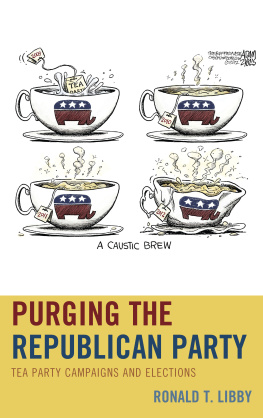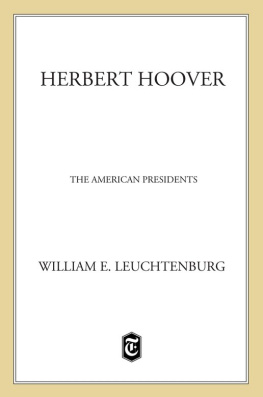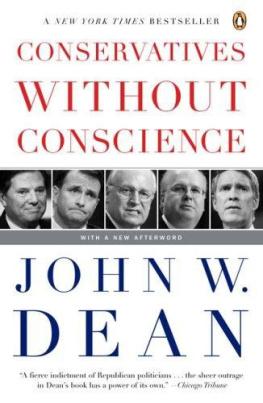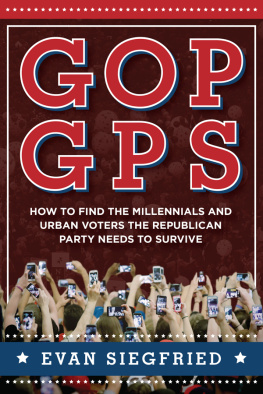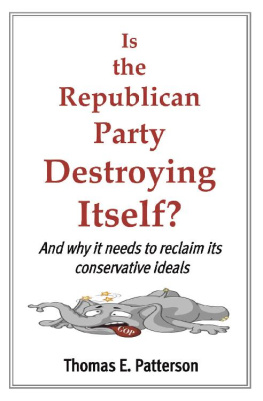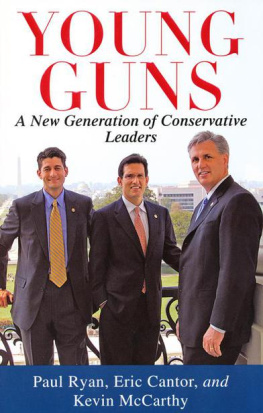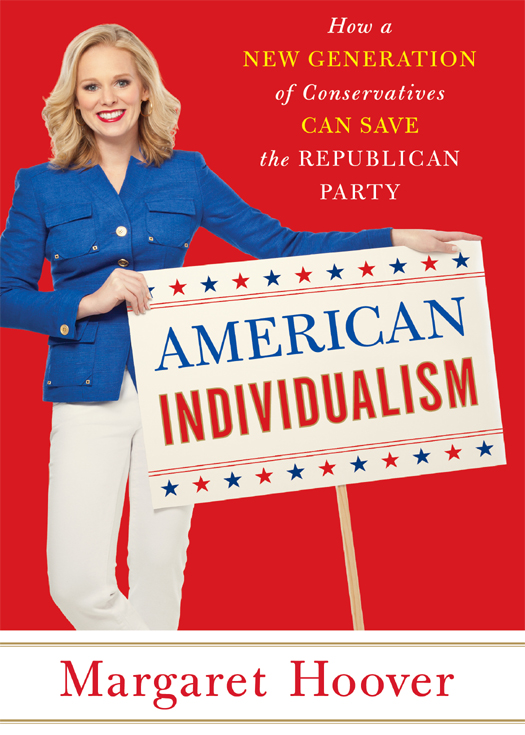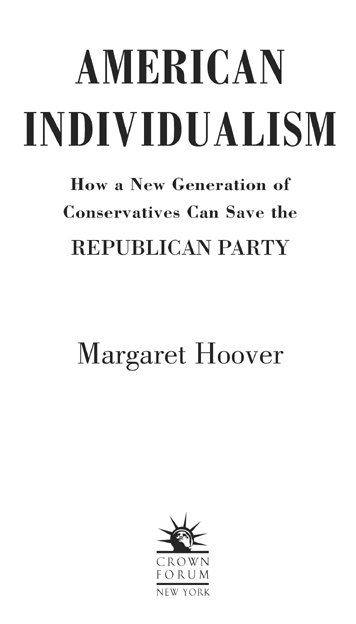Margaret Hoover - American Individualism: How a New Generation of Conservatives Can Save the Republican Party
Here you can read online Margaret Hoover - American Individualism: How a New Generation of Conservatives Can Save the Republican Party full text of the book (entire story) in english for free. Download pdf and epub, get meaning, cover and reviews about this ebook. year: 2011, publisher: Crown Forum, genre: Politics. Description of the work, (preface) as well as reviews are available. Best literature library LitArk.com created for fans of good reading and offers a wide selection of genres:
Romance novel
Science fiction
Adventure
Detective
Science
History
Home and family
Prose
Art
Politics
Computer
Non-fiction
Religion
Business
Children
Humor
Choose a favorite category and find really read worthwhile books. Enjoy immersion in the world of imagination, feel the emotions of the characters or learn something new for yourself, make an fascinating discovery.

- Book:American Individualism: How a New Generation of Conservatives Can Save the Republican Party
- Author:
- Publisher:Crown Forum
- Genre:
- Year:2011
- Rating:3 / 5
- Favourites:Add to favourites
- Your mark:
American Individualism: How a New Generation of Conservatives Can Save the Republican Party: summary, description and annotation
We offer to read an annotation, description, summary or preface (depends on what the author of the book "American Individualism: How a New Generation of Conservatives Can Save the Republican Party" wrote himself). If you haven't found the necessary information about the book — write in the comments, we will try to find it.
Margaret Hoover has been a lifelong member of the Republican Party. She grew up a self-described ditto head. She worked in the White House for President George W. Bush. Today she is a political commentator for Fox News, where, as one of Bill OReillys Culture Warriors, she regularly champions the conservative cause. She also happens to be the great-granddaughter of the thirty-first president of the United States, Herbert Hoover. These impeccable conservative credentials underscore the gravity of her deep-seated concerns about the future of the Republican Party. Her party, she believes, has fallen dangerously out of step with the rising generation of young Americans.
In American Individualism, Margaret Hoover chal-lenges the up-and-coming millennial generation to take another look at the Republican Party. Although millennials rarely identify themselves as Republicans, Hoover contends that these young men and women who helped elect President Barack Obama are sympathetic to the fundamental principles of conservatism. She makes a compelling case for how the GOP can right itself and capture the allegiance of this group. She believes that her party is uniquely positioned to offer solutions for the most pressing problems facing Americaskyrocketing debt and deficits, crises in education and immigration, a war against Islamist supremacybut that it is held back by the outsize influence within the party of social and religious conservatives.
American Individualism is Hoovers call to action for Republicans to embrace a conservatism that emphasizes individual freedom both in economic policy and in the realm of social issues in order to appeal to the new generation of voters. The Republican Party, Hoover asserts, can win the support of the millennials while at the same time remaining faithful to conservative principles. In a journey that is both political and personal, Hoover rediscovers these bedrock conservative values in the writings of her great-grandfather, President Herbert Hoover, who emphasized the vital importance of individual freedom to the American way of life and who sought to strike a delicate balance in identifying the limited yet essential role the federal government should play in the lives of Americans.
Margaret Hoover advocates a conservatism that is fully consistent with the original impulses of the American conservative movement. It evokes her great-grandfathers emphasis on the values of civic responsibility and service to othersinstincts instilled in the millennial generation. She argues that the Republican Party today must evolve in order to achieve greatness, and that it can do so without compromising its tried-and-true fundamental principles. On the contrary, those enduring principles, if consistently applied, will enable the party to attract a younger following.
An impassioned and persuasive political manifesto grounded in twentieth-century history and targeted at
the most perplexing problems of the twenty-first century, Margaret Hoovers American Individualism offers provocative ideas not just for reinvigorating the Republican Party but also for strengthening America in the decades ahead.
Praise for American Individualism:
It is not her great grandfathers Republican party anymore. And Margaret Hoover has written a book that old Herbert would enjoy. Sassy, opinionated, and smart, Ms. Hoover shakes up conventional GOP wisdom.
Bill OReilly, Anchor, Fox News Channel
Margaret Hoover, a fresh and brilliant young voice in the Republican Party, is bent on connecting the GOP to rising generations of the young. She has something to say to their elders, too. Theyd best hear her.
Peggy Noonan, columnist,Wall Street Journal
Margaret Hoovers American Individualism is a must read for every member of the Republican partyelected or otherwiseas a new generation of Republicans try to shine new light on who exactly we should be.
Meghan McCain, author of Dirty Sexy Politics
Margaret Hoover: author's other books
Who wrote American Individualism: How a New Generation of Conservatives Can Save the Republican Party? Find out the surname, the name of the author of the book and a list of all author's works by series.

